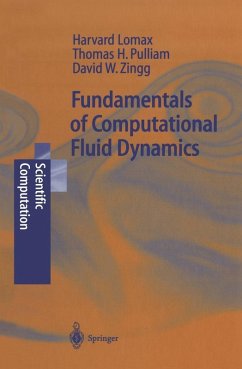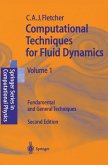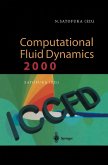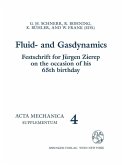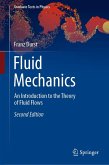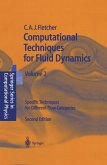This book is intended as a textbook for a first course in computational fluid dynamics and will be of interest to researchers and practitioners as well. It emphasizes fundamental concepts in developing, analyzing, and understanding numerical methods for the partial differential equations governing the physics of fluid flow. The linear convection and diffusion equations are used to illustrate concepts throughout. The chosen approach, in which the partial differential equations are reduced to ordinary differential equations, and finally to difference equations, gives the book its distinctiveness and provides a sound basis for a deep understanding of the fundamental concepts in computational fluid dynamics.
Dieser Download kann aus rechtlichen Gründen nur mit Rechnungsadresse in A, B, BG, CY, CZ, D, DK, EW, E, FIN, F, GR, HR, H, IRL, I, LT, L, LR, M, NL, PL, P, R, S, SLO, SK ausgeliefert werden.
The unaffected style adopted by the authors makes the book very readable and brings a surprising degree of freshness to the mature concepts that are its emphasis. For this reason, in addition to graduate students, the book may appeal to professionals who do not have formal training in CFD but who wish to learn more theory than is found in cookbook-oriented code manuals... [There is a] sharp focus on ideas and analysis rather than tips and techniques ... Datta V. Gaitonde, U.S. Air Force Research Laboratory, in the American Institute for Aeronautics and Astronautics Journal "... the book covers a good set of introductory material and includes some topics and insights not found in other books at this level, along with numerous exercises. In the hands of a knowledgeable instructor, it could form the basis for an excellent course and would be a useful supplement in general." Randall J. LeVeque, University of Washington, in the SIAM Rezension.
From the reviews of the first edition: "[The book] is much needed to fill a gap in the market for texts that try to cover some of the fundamental mathematical aspects of the subject. The book is aimed at graduate students and concentrates an analysing the properties of approximations produced by finite-difference and finite-volume methods. The emphasis throughout the book is on the study of the properties of the techniques as applied to model equations such as the linear convection and diffusion equations. [...] The main strengths of the book are that the theoretical aspects are treated in an elegant and simple manner, making it easy for the reader to appreciate the subtle links between the discrete and continuous operators and linear algebra. The mathematics is self-contained and not daunting. Most of the sections are well written and the section on ordinary differential equations and time marching methods is particularly good." (Contemporary Physics, 44/4, 2003) "An introduction to finite volume methods for initial-boundary value problems for partial differential equations, developed with applications in CFD in mind. [...] The student who has mastered this material will be well equipped for further study and use of numerical methods in the computational disciplines, where one's only guide is often analogy with simple cases. [...] I found the book pleasant to read, and good for students. The level is that of a course for students studying for a Masters degree in their final year. Teachers of similar courses will find the book useful. A good collection of exercises is included." (P. Wesseling, Structural and Multidisciplinary Optimization, 24/6, 2003) "The book is well written and well organized. It can be easily adopted as a textbook for senior or graduate students studying numerical methods of fluid mechanics. Practice exercises are provided at the end of each chapter, some of them expecting the reader to write his own computer codes. This reviewer would regard Fundamentals of Computational Fluid Dynamics as essential to anyone planning to use CFD modeling." (T.A. Kowalewski, Applied Mechanics Review, 55/4, 2002) "[...] emphasizes fundamental concepts in developing, analyzing, and understanding numerical methods for the partial differential equations governing the physics of fluid flow. [...] The chosen approach, in which the partial differential equations are reduced to ordinary differential equations, and finally to difference equations, gives the book its distinctiveness and provides a sound basis for a deep understanding of the fundamental concepts in computational fluid dynamics." (CFD Online, Oct. 21. 2002) "The unaffected style adopted by the authors makes the book very readable and brings a surprising degree of freshness to the mature concepts that are its emphasis. For this reason, in addition to graduate students, the book may appeal to professionals who do not have formal training in CFD but who wish to learn more theory than is found in cookbook-oriented code manuals... [There is a] sharp focus on ideas and analysis rather than tips and techniques ..." (Datta V. Gaitonde, U.S. Air Force Research Laboratory, in the American Institute for Aeronautics and Astronautics Journal) "... the book covers a good set of introductory material and includes some topics and insights not found in other books at this level, along with numerous exercises. In the hands of a knowledgeable instructor, it could form the basis for an excellent course and would be a useful supplement in general." (Randall J. LeVeque, University of Washington, in the SIAM Review) "The objective of this book is to provide an elementary but exhaustive tutorial presentation on computational fluid dynamics (CFD), emphasizing the fundamental principles and surveying a variety of algorithms whose applications range from laminar incompressible flow to hypersonic turbulent flow. The book is aimed at students, who have had little or no experience in this field, both recent graduates as well as researchers ... . In conclusion, it must be mentioned that this textbook includes superb exercises to close each chapter." (Andrzej Icha, Pure and Applied Geophysics, Vol. 161. 2004) "The book contains a broad variety of numerical methods for partial differential equations arising in fluid dynamics. After a brief introduction of conservation laws, the authors discuss various finite volume and finite difference methods. Thereby, also higher-order schemes are introduced, and fundamental concepts of time marching methods are presented. The book is written as a textbook and provides valuable information for students, researchers and practitioners in science and engineering." (A. Meister, Zentralblatt MATH, Vol. 970, 2001)

